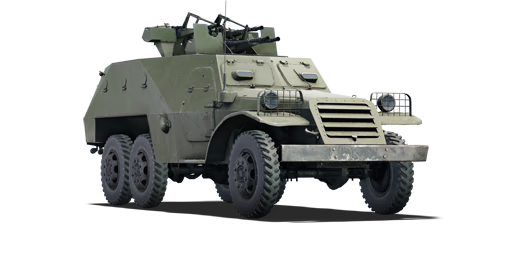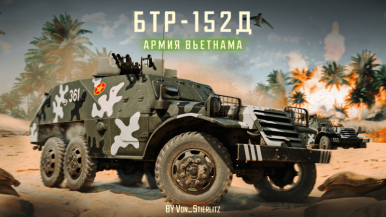

Ground Vehicles
BTR-152D
III
Rank
AB
4.0
RB
4.0
SB
4.0
Battle rating
USSR
Research country
SPAA
Main role
26,000

Research
76,000

Purchase
General information
The BTR-152D is an improved variant of the BTR-152-based self-propelled anti-aircraft gun family. The design incorporates four 14.5 mm KPVT heavy machine guns in a quad mount, increasing the vehicle's firepower over the previous BTR-152A. Other enhancements include an external tire pressure regulation system, a front-mounted winch, and night vision devices for the driver.
Introduced in Update "Kings of Battle", the BTR-152D is very similar to its predecessor. However, firepower is greatly increased, making it much easier to bring down enemy aircraft. Armor-piercing ammunition can penetrate significant armor at close ranges. Nonetheless, it is still lightly armoured and is not recommended to be used to primarily engage enemy ground vehicles.
Camouflages
Survivability and armour
Armour
front / side / back
Hull
13 / 10 / 8 mm
Turret
0 / 0 / 0 mm
Visibility
100 %
Crew
5 persons
Mobility
Max speed
Forward
8390 km/h
Backward
1112 km/h
Power-to-weight ratio
12.51121.817.7 hp/t
Engine power
11097192156 hp
Weight
8.8 t
Optics
Gunner
Commander
Driver
Optics zoom
1.9x–3.5x
—
—
Armaments
4 x 14.5 mm KPVT machine gun
Ammunition
2,400 rounds
Belt capacity
150 rounds
Reload
basic crew → aces
10.4 → 8 s
Fire rate
600 shots/min
Vertical guidance
-5 / 89°
Turret Rotation Speed
basic crew → aces
Horizontal
32.227.456.140.5 → 4639.180.157.9 °/s
Vertical
25.920.77950.6 → 3729.6112.872.2 °/s
| Belt | Belt filling | Armor penetration (mm) at a distance: | |||||
|---|---|---|---|---|---|---|---|
| 10 m | 100 m | 500 m | 1000 m | 1500 m | 2000 m | ||
| AP-I/API-T/IAI | 39 | 37 | 27 | 18 | 13 | 9 | |
| API-T/AP-I(c)/API-T/IAI | 49 | 46 | 34 | 23 | 16 | 11 | |
| IAI/API-T | 38 | 35 | 25 | 17 | 11 | 7 | |
Economy
Repair cost
Basic → Reference
AB
1,416 → 1,837 

RB
1,108 → 1,437 

SB
1,673 → 2,170 

Crew training
22,000 

Experts
76,000 

Aces
400 

Research Aces
320,000 

Reward multiplier
AB / RB / SB
90 / 100 / 150 % 

142 % 

Total cost of modifications
24,700 

44,900 

Talisman cost
1,100 

Research order:
Mobility | |
|---|---|
Protection |
|---|
Firepower | |
|---|---|
Rating by players
You must play more than 3 battles for the last week and more than 10 battles in a vehicle to rate it.
Like:
34
Armor protection:
Not enough ratings
Survivability:
Not enough ratings
Mobility:
Not enough ratings
Armament:
Not enough ratings
Balance:
Not enough ratings
Tips & Tricks
This space is currently empty
Do you know any interesting vehicle features?
Loading...
No articles about this vehicle yet
Become the first author and get rewards!
Write a guide, tell about interesting historical facts, make a tutorial or simply an interesting post.
No more content
